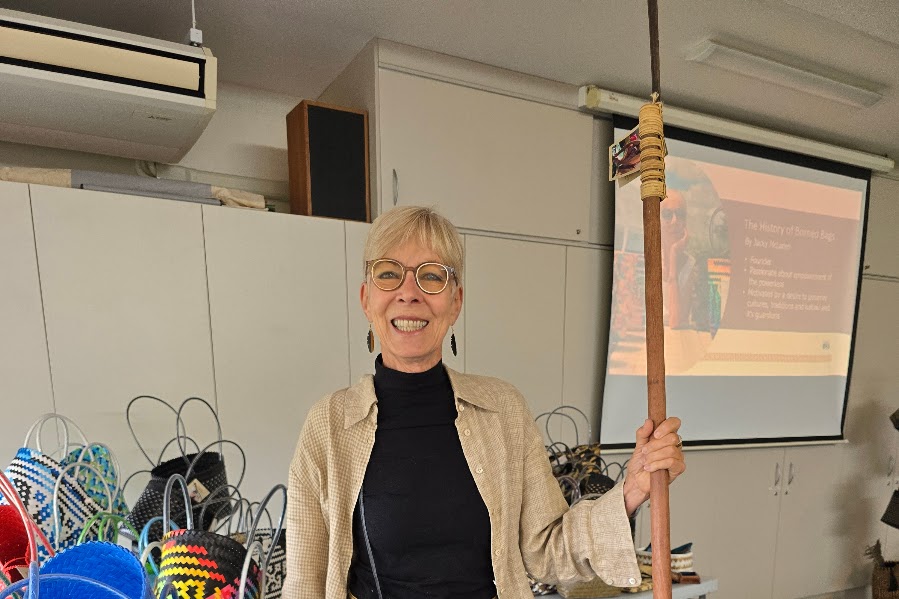19 May 2025
Pete Townend, environmentalist

Tireless campaigner for our coastline, Pete Townend, is the chairperson of the Dacre Cottage Management Committee as well as the organisation Keep Okura Green.
Dacre Cottage is a tiny brick house at Karepiro Bay between the Weiti and Okura river mouths. It's the second oldest building in Auckland (1855) and stands alongside a large, picturesque red barn.
The Dacre Historic Reserve was established by the Rodney District Council and is within the Karepiro Bay Marine Reserve which makes it more than a historic building. The reserve boasts a lot of precious, sometimes rare NZ birds: dotterels, godwits, royal spoonbills, varieties of oyster catchers and a rare heron.
Because the barn can house a lot of people, it can cater for volunteers and visiting groups. It has an educational purpose in relation to the coastal environment as well as history.
Interestingly the quaint little toilet called "the long drop" has a containment tank and is cleaned out by the council every 2 – 3 years!
The old house and barn were rat infested and run down when the volunteers took over in 2005. Most of the materials were brought in by dinghy including the shells in the garden which were purchased from King's.
A lot of Pete's talk was about conservation. Our estuaries and beaches have been overwhelmed with sediment from construction sites. MUD is the enemy he says. He has spent 20 years advocating for Okura and the rest of Gulf and has long concluded that sediment control is not working.
Cover the soil, he says.
An informative and thought provoking talk about the coast we all love.
Below are links to articles about Pete's cause and an upcoming book about Dacre Cottage.
https://newsroom.co.nz/2018/06/07/okura-fight-is-not-over/
https://www.localmatters.co.nz/environm
ent/sediment-control-a-complete-failure/
https://www.dacre.org.nz/book.php
Dacre Cottage is accessible via a 15 minute, somewhat rough walk along a track from the end of Ara Weiti Road off East Coast Road. We will organise a trip there in the not too distant future and Pete will show us inside the cottage.
17 March 2025

Send your grandchildren to Lincoln, said Graeme Rothwell, our March speaker. His agriculture studies at NZ's Lincoln University had taken him to the world's hotspots including Russia and Ukraine after the breakup of the Soviet Union.
Parts of Russia and Ukraine have some of the richest soils in the world, "black" soils called chernozem perfect for grain growing. Twenty-five percent of the world's chernozem soils are in Ukraine and 65% of Ukraine's arable soils are chernozem soils, high in organic matter and nutrients such as phosphorus and potassium. These soils built up over millennia, but need care and attention
Even now with war raging, Ukraine is exporting a large volume of grain
Despite the perfect conditions for agriculture, Russia and Ukraine had a multitude of logistics problems to overcome as they transitioned from the communist system. That is where Graeme's training came in handy working for a branch of the World Bank to help developing countries organise their supply chains
Graeme also drew our attention to the Holodomor 1929 to 1932 which was a terror famine inflicted on Ukraine and the Cossack areas of Russia by Stalin, including areas under dispute now.
Stalin set quotas far above possible output and removed food from the region. Food from other parts of Russia was blocked from coming in.
There were an estimated 12 million deaths (25% of the population) from starvation or murder. This has left deep scars on the relationship between Russia and Ukraine.
It seems ironic that someone from our small country was instrumental in helping Russians and Ukrainians improve their agriculture after the Soviet regime collapsed.
Graeme holds degrees in Agricultural Science and Business Administration. He has extensive experience in the agricultural industry, including management roles in Australia and NZ. Prior to retirement, Graeme worked for the International Finance Corporation (IFC), advising on agribusiness projects in Russia, Ukraine, and Central Asia. Graeme is a member of our History and Science groups.
20 January 2025
Jacky McLaren from Borneo Bags
Jacky gave an excellent presentation on the plight of the Penan people of Borneo, gentle hunter gatherers whose lifestyle has been ruined by deforestation for palm oil plantations.

The Penan people are very small in stature because they evolved with the rainforest where small size gave them a survival advantage.While teaching in Brunei, Jackie noticed the plight of the Penan people and organised the marketing and selling of their handwoven products.
When she returned to New Zealand in 2015 she set up Borneo Bags to continue helping the Penan.Some of the bags are still made from the original rattan while the bulk are made from recycled pallet straps.
They are very beautiful and practical bags. If you are looking for an exciting gift for someone, please see their website. Their phone bags look very accommodating for the modern cell phone.
Jackie gave us a demonstration of the Penan's blow pipe, shooting a dart (unpoisoned) into a balloon. She said it was curious that indigenous people in both Brazil and Borneo used similar hunting techniques.
Pictured is Jackie with the blow pipe and some of the bags.
November 2024
Dr Willo Steer
Willo talked about climate change from the point of view of a geologist. Are we still in the Holocene era or should we call it the Anthropogene era? Willo leads the large Geology group at the Warkworth U3A.
